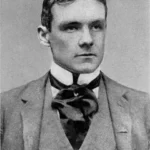 | |
The Log of the “Jolly Polly” | |
| Author | Richard Harding Davis |
|---|---|
| Published |
1885
|
| Language | English |
| Nationality | American |
| Genre | Adventure, Mystery |
1885 Short Story
The Log of the “Jolly Polly”
The Log of the “Jolly Polly” is an English Adventure, Mystery short story by American writer Richard Harding Davis. It was first published in 1885.
The Log of the “Jolly Polly”
by Richard Harding Davis
Temptation came to me when I was in the worst possible position to resist it.
It is a way temptation has. Whenever I swear off drinking invariably I am invited to an ushers’ dinner. Whenever I am rich, only the highbrow publications that pay the least, want my work. But the moment I am poverty-stricken the MANICURE GIRL’S MAGAZINE and the ROT AND SPOT WEEKLY spring at me with offers of a dollar a word. Temptation always is on the job. When I am down and out temptation always is up and at me.
When first the Farrells tempted me my vogue had departed. On my name and “past performances” I could still dispose of what I wrote, but only to magazines that were just starting. The others knew I no longer was a best-seller. All the real editors knew it. So did the theatrical managers.
My books and plays had flourished in the dark age of the historical-romantic novel. My heroes wore gauntlets and long swords. They fought for the Cardinal or the King, and each
loved a high-born demoiselle who was a ward of the King or the Cardinal, and with feminine perversity, always of whichever one her young man was fighting. With people who had never read Guizot’s “History of France,” my books were popular, and for me made a great deal of money. This was fortunate, for my parents had left me nothing save expensive tastes. When the tastes became habits, the public left me. It turned to white-slave and crook plays, and to novels true to life; so true to life that one felt the author must at one time have been a masseur in a Turkish bath.
So, my heroines in black velvet, and my heroes with long swords were “scrapped.” As one book reviewer put it, “To expect the public of to-day to read the novels of Fletcher Farrell is like asking people to give up the bunny hug and go back to the lancers.”
And, to make it harder, I was only thirty years old.
It was at this depressing period in my career that I received a letter from Fairharbor, Massachusetts, signed Fletcher Farrell. The letter was written on the business paper of the Farrell Cotton Mills, and asked if I were related to the Farrells of Duncannon, of the County Wexford, who emigrated to Massachusetts in 186o. The writer added that he had a grandfather named Fletcher and suggested we might be related. From the handwriting of Fletcher Farrell and from the way he ill-treated the King’s English I did not feel the ties of kinship calling me very loud. I replied briefly that my people originally came from Youghal, in County Cork, that as early as 1730 they had settled in New York, and that all my relations on the Farrell side either were still at Youghal, or dead. Mine was not an encouraging letter; nor did I mean it to be; and I was greatly surprised two days later to receive a telegram reading, “Something to your advantage to communicate; wife and self calling on you Thursday at noon. Fletcher Farrell.” I was annoyed, but also interested. The words “something to your advantage” always possess a certain charm. So, when the elevator boy telephoned that Mr. and Mrs. Farrell were calling, I told him to bring them up.
My first glance at the Farrells convinced me the interview was a waste of time. I was satisfied that from two such persons, nothing to my advantage could possibly emanate. On the contrary, from their lack of ease, it looked as though they had come to beg or borrow. They resembled only a butler and housekeeper applying for a new place under the disadvantage of knowing they had no reference from the last one. Of the two, I better liked the man. He was an elderly, pleasant-faced Irishman, smooth-shaven, red-cheeked, and with white hair. Although it was July, he wore a frock coat, and carried a new high hat that glistened. As though he thought at any moment it might explode, he held it from him, and eyed it fearfully. Mrs. Farrell was of a more sophisticated type. The lines in her face and hands showed that for years she might have known hard physical work. But her dress was in the latest fashion, and her fingers held more diamonds than, out of a showcase, I ever had seen.
With embarrassment old man Farrell began his speech. Evidently it had been rehearsed and as he recited it, in swift asides, his wife prompted him; but to note the effect he was making, she kept her eyes upon me. Having first compared my name, fame, and novels with those of Charles Dickens, Walter Scott, and Archibald Clavering Gunter, and to the disadvantage of those gentlemen, Farrell said the similarity of our names often had been commented upon, and that when from my letter he had learned our families both were from the South of Ireland, he had a premonition we might be related. Duncannon, where he was born, he pointed out, was but forty miles from Youghal, and the fishing boats out of Waterford Harbor often sought shelter in Blackwater River. Had any of my forebears, he asked, followed the herring?
Alarmed, lest at this I might take offense, Mrs. Farrell interrupted him.
“The Fletchers and O’Farrells of Youghal she exclaimed, “were gentry. What would they be doing in a trawler?”
I assured her that so far as I knew, 1750 being before my time, they might have been smugglers and pirates.
“All I ever heard of the Farrells,” I told her, begins after they settled in New York. And there is no one I can ask concerning them. My father and mother are dead; all my father’s relatives are dead, and my mother’s relatives are as good as dead. I mean,” I added, “we don’t speak!”
To my surprise, this information appeared to afford my visitors great satisfaction. They exchanged hasty glances.
“Then,” exclaimed Mr. Farrell, eagerly; “if I understand you, you have no living relations at all–barring those that are dead!”
“Exactly!” I agreed.
He drew a deep sigh of relief. With apparent irrelevance but with a carelessness that was obviously assumed, he continued.
“Since I come to America,” he announced, “I have made heaps of money. “As though in evidence of his prosperity, he flashed the high hat. In the sunlight it coruscated like one of his wife’s diamonds. “Heaps of money,” he repeated. “The mills are still in my name, he went on, “but five years since I sold them– We live on the income. We own Harbor Castle, the finest house on the whole waterfront.”
“When all the windows are lit up,” interjected Mrs. Farrell, “it’s often took for a Fall River boat!”
“When I was building it,” Farrell continued, smoothly, “they called it Farrell’s Folly; but not NOW.” In friendly fashion he winked at me, “Standard Oil,” he explained, “offered half a million for it. They wanted my wharf for their tank steamers. But, I needed it for my yacht!”
I must have sat up rather too suddenly, for, seeing the yacht had reached home, Mr. Farrell beamed. Complacently his wife smoothed an imaginary wrinkle in her skirt.
“Eighteen men!” she protested, “with nothing to do but clean brass and eat three meals a day!”
Farrell released his death grip on the silk hat to make a sweeping gesture.
“They earn their wages,” he said generously.
“Aren’t they taking us this week to Cap May?”
“They’re taking the yacht to Cape May! corrected Mrs. Farrell; “not ME!”
“The sea does not agree with her,” explained Farrell; “WE’RE going by automobile.” Mrs. Farrell now took up the wondrous tale
It’s a High Flyer, 1915 model,” she explained; “green, with white enamel leather inside, and red wheels outside. You can see it from the window.”
Somewhat dazed, I stepped to the window and found you could see it from almost anywhere. It was as large as a freight car; and was entirely surrounded by taxi-starters, bellboys, and nurse-maids. The chauffeur, and a deputy chauffeur, in a green livery with patent-leather leggings, were frowning upon the mob. They possessed the hauteur of ambulance surgeons. I returned to my chair, and then rose hastily to ask if I could not offer Mr. Farrell some refreshment.
“Mebbe later,” he said. Evidently he felt that as yet he had not sufficiently impressed me.
“Harbor Castle,” he recited, “has eighteen bedrooms, billiard-room, music-room, art gallery and swimming-pool.” He shook his head. “And no one to use ’em but us. We had a boy.” He stopped, and for an instant, as though asking pardon, laid his hand upon the knee of Mrs. Farrell. “But he was taken when he was four, and none came since. My wife has a niece,” he added, “but—-“
“But,” interrupted Mrs. Farrell, “she was too high and mighty for plain folks, and now there is no one. We always took an interest in you because your name was Farrell. We were always reading of you in the papers. We have all your books, and a picture of you in the billiard-room. When folks ask me if we are any relation–sometimes I tell ’em we ARE.”
As though challenging me to object, she paused.
“It’s quite possible,” I said hastily. And, in order to get rid of them, I added: “I’ll tell you what I’ll do. I’ll write to Ireland and—-“
Farrell shook his head firmly. “You don’t need to write to Ireland,” he said, “for what we want.”
“What DO you want?” I asked.
“We want a SON,” said Farrell; “an adopted son. We want to adopt YOU!”
“You want to WHAT?” I asked.
To learn if Mrs. Farrell also was mad, I glanced toward her, but her expression was inscrutable. The face of the Irishman had grown purple.
“And why not?” he demanded. “You are a famous young man, all right, and educated. But there’s nothing about me I’m ashamed of! I’m worth five million dollars and I made every cent Of it myself–and I made it honest. You ask Dun or Bradstreet, ask—-“
I attempted to soothe him.
“THAT’S not it, sir, ” I explained. “It’s a most generous offer, a most flattering, complimentary offer. But you don’t know me. I don t know you. Choosing a son is a very—-“
“I’ve had you looked up,” announced Mrs. Farrell. “The Pinkertons give you a high rating. I hired ’em to trail you for six months.”
I wanted to ask WHICH six months, but decided to let sleeping dogs lie. I shook my head. Politely but firmly I delivered my ultimatum.
“It is quite impossible!” I said firmly.
Mrs. Farrell continued the debate. She talked in a businesslike manner and pronounced the arrangement one by which both sides would benefit. There were thousands of other Farrells, she pointed out, any one of whom they might have adopted. But they had selected me because in so choosing, they thought they were taking the least risk. They had decided she was pleased to say, that I would not disgrace them, and that as a “literary author ” I brought with me a certain social asset.
A clever, young businessman they did not want. Their business affairs they were quit able to manage themselves. But they would like as an adopted son one who had already added glory to the name of Farrell, which glory he was willing to share.
“We wouldn’t tie you down,” she urged “but we would expect you to live at Harbor Castle a part of your time, and to call us Ma and Pa. You would have your own rooms, and your own servant, and there is a boat-house on the harbor front, where you could write your novels.”
At this, knowing none wanted my novels, I may have winced, for, misreading my discontent, Farrell hastily interrupted.
“You won’t have to work at all,” he protested heartily. “My son can afford to live like a lord. You’ll get all the spending money you want, and if you’re fond of foreign parts, you can take the yacht wherever you please!”
“The farther the better,” exclaimed Mrs. Farrell with heat. “And when you get it there, I hope you’ll SINK it!”
“Maybe your friends would come and visit You,” suggested Farrell, I thought, a trifle wistfully. “There’s bathing, tennis, eight… bedrooms, billiard-room, art gallery—-“
“You told him that!” said Mrs. Farrell.
I was greatly at a loss. Their offer was preposterous, but to them, it was apparently a perfectly possible arrangement. Nor were they acting on impulse. Mrs. Farrell had admitted that for six months she had had me “trailed.” How to say “No” and not give offense, I found difficult. They were deeply in earnest and I could see that Farrell, at least, was by instinct generous, human, and kind. It was, in fact, a most generous offer. But how was I to tell them tactfully I was not for sale, that I was not looking for “ready-to-wear” parents, and that if I were in the market, they were not the parents I would choose. I had a picture of life at Harbor Castle, dependent upon the charity of the Farrells. I imagined what my friends would say to me, and worse, what they would say behind my back. But I was not forced to a refusal.
Mr. Farrell rose.
“We don’t want to hurry you,” he said. “We want you to think it over. Maybe if we get acquainted—-“
Mrs. Farrell smiled upon me ingratiatingly.
“Why don’t we get acquainted now?” she demanded. “We’re motoring down to Cape May to stay three weeks. Why don’t you come along–as our guest–and see how you like us?”
I assured them, almost too hastily, that already was deeply engaged.
As they departed, Farrell again admonished me to think it over.
“And look me up at Dun’s and Bradstreet’s,” he advised. “Ask ’em about me at the Waldorf. Ask the head waiters and bellhops if I look twice at a five spot!”
It seemed an odd way to select a father, but I promised.
I escorted them even to the sidewalk, and not without envy watched them sweep toward the Waldorf in the High Flyer, 1915 model. I caught myself deciding, were it mine, I would paint it gray.
I was lunching at the Ritz with Curtis Spencer, and I looked forward to the delight he would take in my story of the Farrells. He would probably want to write it. He was my junior, but my great friend; and as a novelist his popularity was where five years earlier mine had been. But he belonged to the new school. His novels smelled like a beauty parlor; and his heroines, while always beautiful, were, on occasions, virtuous, but only when they thought it would pay.
Spencer himself was as modern as his novels, and I was confident his view of my adventure would be that of the great world which he described so accurately.
But to my amazement when I had finished he savagely attacked me.
“You idiot!” he roared. “Are you trying to tell me you refused five million dollars– just because you didn’t like the people who wanted to force it on you? Where,” he demanded, “is Cape May? We’ll follow them now! We’ll close this deal before they can change their minds. I’ll make you sign to-night. And, then,” he continued eagerly, “we’ll take their yacht and escape to Newport, and you’ll lend me five thousand dollars, and pay my debts, and give me back the ten you borrowed. And you might buy me a touring-car and some polo ponies and–and–oh, lots of things. I’ll think of them as we go along. Meanwhile, I can’t afford to give luncheons to millionaires, so you sign for this one; and then we’ll start for Cape May.”
“Are you mad?” I demanded; “do you think I’d sell my honor!”
“For five million dollars?” cried Spencer. “Don’t make me laugh! If they want a REAL novelist for a son they can adopt me!”
I replied with dignity that I would not disgrace the memory of my parents.
“You have disgraced them!” retorted Spencer, “with your Musketeer novels for infants. You need money. To get it you may be tempted to write more novels. Here’s your chance! Stop robbing the public, and lead an honest life. Think of all the money you could give to the poor, think of all the money you and I could lose at Monte Carlo!”
When he found I would not charter an auto-mobile and at once pursue the Farrells he changed his tactics. If I would not go to Cape May, then, he begged, I would go to Fairharbor. He asked that I would, at least, find out what I was refusing. Before making their offer, for six months, the Farrells had had me “looked up, ” but, without knowing anything of them, after a talk of ten minutes I had turned them down. “Was that,” he asked, “intelligent? Was it fair to the Farrells?” He continued to tempt me.
“They told you to think it over,” he persisted. “Very well, then, think it over at Fairharbor! For the next three weeks the Farrells will be at Cape May. The coast is clear. Go to Fairharbor as somebody else and be your own detective. Find out if what they tell you is true. Get inside information. Get inside Harbor Castle. Count the eighteen bedrooms and try the beds. Never mind the art gallery, but make sure there is a wine cellar.
You can’t start too soon, and I WILL GO WITH YOU!”
I told him where he could go.
We then tossed to see who should pay for the lunch and who should tip the head waiter. I lost and had to tip the head waiter. We separated, and as I walked down the Avenue, it seemed as though to the proprietor of every shop I passed I owed money. Owing them the money I did not so much mind; what most distressed me was that they were so polite about it. I had always wanted to reward their patience. A favorite dream of mine was to be able to walk down Fifth Avenue, my pockets stuffed with yellow bills, paying off my debts. Compared with my steadily decreasing income, how enormous my debts appeared; but when compared with the income of a man worth– say-five million dollars, how ridiculous! I had no more than reached my apartment, than a messenger-boy arrived with an envelope. It contained a ticket for a round trip on the New Bedford Line boat leaving that afternoon, a ticket for a stateroom, and a note from Curtis Spencer. The latter read: “The boat leaves at six to-night. You arrive at New Bedford seven to-morrow morning. New Bedford and Fairharbor are connected by a bridge. CROSS IT!”
I tore the note in tiny fragments, and tossed them through the open window. I was exceedingly angry. As I stood at the window adding to the name of Curtis Spencer insulting aliases, the street below sent up hot, stifling odors: the smoke of taxicabs, the gases of an open subway, the stale reek of thousands of perspiring, unwashed bodies. From that one side street seemed to rise the heat and smells of all New York. For relief I turned to my work-table where lay the opening chapters of my new novel, “The White Plume of Savoy.” But now, in the light of Spencer’s open scorn, I saw it was impudently false, childish, sentimental. My head ached, the humidity sapped my strength, at heart I felt sick, sore, discouraged. I was down and out. And seeing this, Temptation, like an obsequious floorwalker, came hurrying forward.
“And what may I show you to-day?” asked Temptation. He showed me the upper deck of the New Bedford boat feeling her way between the green banks of the Sound. A cool wind swept past me bearing clean, salty odors; on the saloon deck a band played, and from the darkness the lighthouses winked at me, and in friendly greeting the stars smiled. Temptation won. In five minutes I was feverishly packing, and at five-thirty I was on board. I assured myself I had not listened to Temptation, that I had no interest in Fairharbor. was taking the trip solely because it would give me a night’s sleep on the Sound. I promised myself that on the morrow I would not even LOOK toward Harbor Castle; but on the evening following on the same boat, return to New York. Temptation did not stop to argue, but hastened after another victim.
I turned in at nine o’clock and the coolness, and the salt air, blessed me with the first sleep I had known in weeks. And when I woke we were made fast to the company’s wharf at New Bedford, and the sun was well up. I rose refreshed in body and spirit. No longer was I discouraged. Even “The White Plume of Savoy” seemed a perfectly good tale of romance and adventure. And the Farrells were a joke. Even if I were at Fairlharbor, I was there only on a lark, and at the expense of Curtis Spencer, who had paid for the tickets. Distinctly the joke was on Curtis Spencer. I lowered the window screen, and looked across the harbor. It was a beautiful harbor. At ancient stone wharfs Jay ancient whalers with drooping davits and squared yards, at anchor white-breasted yachts flashed in the sun, a gray man-of-war’s man flaunted the week’s laundry, a four-masted schooner dried her canvas, and over the smiling surface of the harbor innumerable fishing boats darted. With delight I sniffed the odors of salt water, sun-dried herring, of oakum and tar. The shore opposite was a graceful promontory crowned with trees and decorous gray-shingled cottages set in tiny gardens that reached to the very edge of the harbor. The second officer was passing my window and I asked what the promontory was called.
“Fairharbor,” he said. He answered with such proprietary pride and smiled upon Fairharbor with such approval that I ventured to guess it was his home.
“That’s right,” he said; “I used to live at the New York end of the run-in a flat. But never again! No place for the boy to play but in the street. I found I could rent one of those old cottages over there for the same money I paid for the flat. So I cut out New York. My boy lives in a bathing suit now, and he can handle a catboat same as me. We have a kitchen garden, and hens, and the fishermen here will give you all the fish you can carry away–fish right out of the water. I guess I’ve smashed the high cost of living problem all right. I wouldn’t go back to living in New York now–not if they gave me the PILGRIM.
As though trying to prod my memory, I frowned. It was my conception of the part of a detective. “Hasn’t Fletcher Farrell,” I asked, “a house in Fairharbor?”
“Harbor Castle,” said the mate promptly. “It’s on the other side of the point I’d as soon live in a jail!”
“Why?” I exclaimed.
But he was no longer listening. He pointed at the shore opposite.
“See that flag running up the staff in that garden?” he cried. “‘That’s my boy signalling. I got to get to the boat deck and wave back!”
I felt as a detective. I had acquired important information. The mate, a man of judgment, preferred Fairharbor to New York. Also, to living in Harbor Castle, he preferred going to jail.
The boat on which I had arrived was listed to start back at six the same evening on her return trip to New York. So, at the office of the line I checked my valise, and set forth to explore New Bedford.
The whaling vessels moored to a nearby wharf, I inspected from hatches to keels, and by those on board was directed to a warehouse where were stored harpoons, whalebone, and wooden figure-heads. My pleasure in these led to my being passed on to a row of “antique” shops filled with relics of the days of whaling and also with genuine pie-crust tables, genuine flint-lock muskets, genuine Liverpool pitchers. I coveted especially old-time engravings of the whalers, and was told at Hatchardson’s book-store on the main street others could be found in profusion.
Hatchardson’s proved to be a place of great delight. As you entered there were counters for magazines and post-cards, popular music, and best-selling novels, while in the rear of the shop tables and shelves were stocked with ancient volumes, and on the wall surrounding them hung engravings, prints and woodcuts of even the eighteenth century. Just as the drugstore on the corner seemed to be a waiting station for those of New Bedford who used the trolley-cars, so for those who moved in automobiles, or still clung to the family carriage, Hatchardson’s appeared to be less a shop than a public meeting-place. I noticed that the clerks, most of whom were women, were with the customers on a most friendly footing, addressing them, and by them being addressed by name. Finding I was free to wander where I pleased, I walked to the rear of the shop and from one of the tables picked up a much-worn volume. It was entitled “The Log of the JOLLY POLLY, and was illustrated with wood cuts showing square- rigged ships and whales Spouting. For five minutes, lost to my Surroundings, I turned the pages; and then became conscious that across the table some one was watching me. I raised my eyes and beheld a face of most surprising charm, intelligence and beauty. It was so lovely that it made me wince. The face was the fortune, and judging from the fact that in her hand she held a salesbook, the sole fortune, of a tall young girl who apparently had approached to wait on me. She was looking toward the street, so that, with the book- shelves for a back-ground, her face was in profile, and I determined swiftly that if she were to wait on me she would be kept waiting as long as my money lasted. I did not want “The Log of the JOLLY POLLY,” but I did want to hear the lovely lady speak, and especially I desired that the one to whom she spoke should be myself.
“What is the price of this?” I asked. With magnificent self- control I kept my eyes on the book, but the lovely lady was so long silent that I raised them. To my surprise, I found on her face an expression of alarm and distress. With reluctance, and yet within her voice a certain hopefulness, she said, “Fifty dollars.”
Fifty dollars was a death blow. I had planned to keep the young lady selling books throughout the entire morning, but at fifty dollars a book, I would soon be owing her money. I attempted to gain time.
“It must be very rare!” I said. I was afraid to look at her lest my admiration should give offense, so I pretended to admire the book.
“It is the only one in existence,” said the young lady. “At least, it is the only one for sale! “
We were interrupted by the approach of a tall man who, from his playing the polite host and from his not wearing a hat, I guessed was Mr. Hatchardson himself. He looked from the book in my hand to the lovely lady and said smiling, “Have you lost it?”
The girl did not smile. To her, apparently, it was no laughing matter. “I don’t know–yet,” she said. Her voice was charming, and genuinely troubled.
Mr. Hatchardson, for later I learned it was he, took the book and showed me the title-page.
“This was privately printed in 1830,” he said, “by Captain Noah Briggs. He distributed a hundred presentation copies among his family and friends here in New Bedford. It is a most interesting volume.”
I did not find it so. For even as he spoke the young girl, still with a troubled countenance, glided away. Inwardly I cursed Captain Briggs and associated with him in my curse the polite Mr. Hatchardson. But, at his next words my interest returned. Still smiling, he lowered his voice.
“Miss Briggs, the young lady who just left us,” he said, is the granddaughter of Captain Briggs, and she does not want the book to go out of the family; she wants it for herself.” I interrupted eagerly.
“But it is for sale?” Mr. Hatchardson reluctantly assented.
“Then I will take it,” I said.
Fifty dollars is a great deal of money, but the face of the young lady had been very sad. Besides being sad, had it been aged, plain, and ill-tempered, that I still would have bought the book, is a question I have never determined.
To Mr. Hatchardson, of my purpose to give the book to Miss Briggs, I said nothing. Instead I planned to send it to her anonymously by mail. She would receive it the next morning when I was arriving in New York, and, as she did not know my name, she could not possibly return it. At the post-office I addressed the “Log” to “Miss Briggs, care of Hatchardson’s Bookstore,” and then I returned to the store. I felt I had earned that pleasure. This time, Miss Briggs was in charge of the post-card counter, and as now a post-card was the only thing I could afford to buy, at seeing her there I was doubly pleased. But she was not pleased to see me. Evidently Mr. Hatchardson had told her I had purchased the “Log” and at her loss her very lovely face still showed disappointment. Toward me her manner was distinctly aggrieved.
But of the “Log” I said nothing, and began recklessly purchasing post-cards that pictured the show places of New Bedford. Almost the first one I picked up was labelled “Harbor Castle. Residence of Fletcher Farrell.” I need not say that I studied it intently. According to the post-card, Harbor Castle stood on a rocky point with water on both sides. It was an enormous, wide-spreading structure, as large as a fort. It exuded prosperity, opulence, extravagance, great wealth. I felt suddenly a filial impulse to visit the home of my would-be forefathers.
“Is this place near here?” I asked.
Miss Briggs told me that in order to reach it I should take the ferry to Fairbarbor, and then cross that town to the Buzzards Bay side.
“You can’t miss it,” she said. “It’s a big stone house, with red and white awnings. If you see anything like a jail in ruffles, that’s it.”
It was evident that with the home I had rejected Miss Briggs was unimpressed; but seeing me add the post-card to my collection, she offered me another.
“This,” she explained, “is Harbor Castle from the bay. That is their yacht in the foreground.”
The post-card showed a very beautiful yacht of not less than two thousand tons. Beneath it was printed “HARBOR LIGHTS; steam yacht owned by Fletcher Farrell.” I always had dreamed of owning a steam yacht, and seeing it stated in cold type that one was owned by “Fletcher Farrell,” even though I was not that Fletcher Farrell, gave me a thrill of guilty pleasure. I gazed upon the post-card with envy.
“HARBOR LIGHTS is a strange name for a yacht,” I ventured. Miss Briggs smiled.
“Not for that yacht,” she said. “She never leaves it.”
I wished to learn more of my would-be parents, and I wished to keep on talking with the lovely Miss Briggs, so, as an excuse for both, I pretended I was interested in the Farrells because I had something I wanted to sell them.
“This Fletcher Farrell must be very rich,” I said. ” I wonder,” I asked, “if I could sell him an automobile?” The moment I spoke I noticed that the manner of Miss Briggs toward Me perceptibly softened. Perhaps, from my buying offhand a fifty-dollar book she had thought me one of the rich, and had begun to suspect I was keeping her waiting on me only because I found her extremely easy to look at. Many times before, in a similar manner, other youths must have imposed upon her, and perhaps, also, in concealing my admiration, I had not entirely succeeded.
But, when she believed that, like herself, I was working for my living, she became more human.
“What car are you selling?” she asked. “I am TRYING to sell,” I corrected her, “the Blue Bird, six cylinder.”
“I never heard of it,” said Miss Briggs.
“Nor has any one else,” I answered, with truth. “That is one reason why I can’t sell it. I arrived here this morning, and,” I added with pathos, “I haven’t sold a car yet!”
Miss Briggs raised her beautiful eyebrows skeptically. “Have you tried?” she said.
A brilliant idea came to me. In a side street I had passed a garage where Photaix cars were advertised for hire. I owned a Phoenix, and I thought I saw a way by which, for a happy hour, I might secure the society of Miss Briggs.
“I am an agent and demonstrator for the Phoenix also,” I said glibly; “maybe I could show you one?”
“Show me one?” exclaimed Miss Briggs. “One sees them everywhere! They are always under your feet!”
“I mean,” I explained, “might I take you for a drive in one?”
It was as though I had completely vanished. So far as the lovely Miss Briggs was concerned I had ceased to exist. She turned toward a nice old lady.
“What can I show you, Mrs. Scudder?” she asked cheerily; “and how is that wonderful baby? “
I felt as though I had been lifted by the collar, thrown out upon a hard sidewalk, and my hat tossed after me. Greatly shaken, and mentally brushing the dust from my hands and knees, I hastened to the ferry and crossed to Fairharbor. I was extremely angry. By an utter stranger I had been misjudged, snubbed and cast into outer darkness. For myself I readily found excuses. If a young woman was so attractive that at the first sight of her men could not resist buying her fifty-dollar books and hiring automobiles in which to take her driving, the fault was hers. I assured myself that girls as lov







